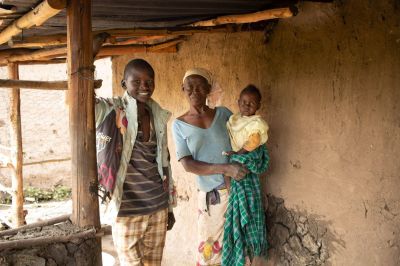
One of the very first decisions I made when I became a missions pastor was to stop our short-term mission teams from visiting orphanages.
Our church had a long history of sending teams to love and care for children in orphanages, so naturally, this action was met with resistance. But it was the right thing to do.
Before becoming a pastor, I was a missionary for several years in the Horn of Africa. At one point, the government of Djibouti wanted us to open an orphanage. While the idea seemed like a wonderful way to share the love of Christ with the most vulnerable, we took time to consider it more deeply, as it would be a huge shift in our ministry. As we began research and learned more about orphan care, we became aware of the serious misconceptions we held about orphans and orphanages.
Perhaps the most shocking fact was that most children in orphanages have living parents or other family members who could care for them.
Around the world, 80% of children in orphanages are not truly orphans. Poverty — not lack of family — is the primary reason they end up in residential care.
Many Christians assume orphanages are necessary to provide orphaned children with food, shelter, and protection. But in reality, orphanages create orphans — not the other way around. Orphanages provide vulnerable families with a way to provide for their children but result in the separation of children from their families.
As a church, we send teams all over the world. These teams often wanted to help care for children at a local orphanage. Sadly, we have seen firsthand the devastating effects of these practices. The teams would go with the best of intentions: namely, to shower kids with love and attention.
But even the best intentions can be harmful when not properly informed.
Research shows us, for instance, that children are hard-wired to attach to their caregivers. All children need long-term, stable attachment for healthy development. So, when mission teams come and shower the kids with attention and affection — holding them constantly, taking selfies, and even saying things like, “I love you” and “I’m coming back,” but leave two weeks later never to return, the children are the ones who suffer.
This repetitive cycle of broken bonds and broken trust can severely damage a child’s ability to form healthy relationships. It can even contribute to children’s attachment disorders, which can adversely affect them for the rest of their lives.
But the impact of the present STM culture extends far past the individual and often unintentionally harms relationships with children that well-meaning missionaries form.
Orphanages are inherently flawed systems, ones that ultimately cause harm to vulnerable children. At best, children living in orphanages may struggle with physical, cognitive, and social-emotional delays. At worst, STM teams can inadvertently perpetuate a system where children are vulnerable to abuse or exploitation.
Many people who’ve gone on a STM trip have visited an orphanage and have seen no immediate cause for concern. In fact, a recent Barna study estimates that 4 million Christians have visited an orphanage or a children’s home on a mission trip. However, the absence of visible issues doesn’t mean underlying problems don’t exist.
For years, my church financially supported an orphanage in Haiti with short-term mission teams visiting every year. On each trip, the orphanage leadership was friendly, and the children seemed happy and well cared for. But it wasn’t until one of our church members became a full-time missionary at that orphanage that we discovered both rampant corruption and pervasive sexual abuse of the children.
Sadly, this orphanage wasn’t an outlier. Studies show that children living in orphanages are more vulnerable to violence, abuse, and exploitation. A study in Tanzania found that 89% of children reported abuse while in institutional care.
But churches have the opportunity to shift the focus and practices of their short-term mission trips by taking a stand against residential care for children and supporting family-based solutions for these children instead. This new perspective reflects what research shows us is best for the vulnerable kids we want to serve.
On one recent STM trip our church did, we visited Agape Children’s Ministry in Kenya, where our team learned firsthand the benefits of seeing vulnerable children cared for in families. Children in Kenya who have been reunited with their families have better relationships and better outcomes for the future, and entire communities have changed as a result. On another trip, a team worked with Children’s HopeChest as they helped to strengthen families who might otherwise be at risk of placing their children in an orphanage.
These experiences and others opened our eyes to the need to focus our STM trips away from meeting the perceived needs of children and instead supporting actual long-term solutions that help children thrive into adulthood.
Those at our church who want to go on STM trips are committed to doing what’s best for children, even when the immediate outward results look different than they used to. And we’re okay with that, because we know God is moving in powerful ways in His time.
Though we continue to be presented with opportunities to visit orphanages during our trips, we remain committed to declining these opportunities and explaining the reasons why.
As churches around the country prepare to send out short-term mission teams this summer, they should consider alternatives to visiting orphanages — ones that truly support vulnerable children and strengthen families, creating a lasting, positive impact on both the children and the broader community.
Jacob Lierz is the Global Mission and Local Outreach Pastor at LifeMission Church.















